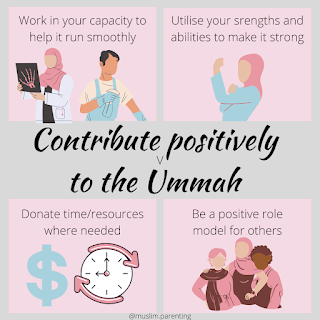
If you’re a new parent (or even a l time parent) and don’t know where to start with parenting your child then here are the top 5 important aims of Islamic parenting.
1. To be Righteous Muslims
The first and most important is to raise children to worship our Creator, Allah, and follow the Sunnah of the Prophet (s). When your child is young the best way to do this is to be the model. Let your child observe you doing acts of worship. Lay the foundation and encourage your child to imitate you. At the age of discernment, which is about 7 years of age, you can then formally teach the required ibadah.
2. To be Dutiful to Parents
Whenever Allah mentioned in the Quran for us to be obedient to Him, He immediately follows it with telling us to be obedient to parents. (See Surah Luqman.) This is the important status that Allah has given to parents. This is the second important aim of our parenting. To do this, you’d need to connect with your child and build a close relationship. This starts from birth. Respond to your child’s needs. Interact with him. Keep communications open. When your child becomes older it’ll be easier for her to talk and listen to you.
The next three aims are about building character and skills.
3. Do Good and Forbid Evil
The age of discernment is fully developed by 7 years of age but it doesn't happen overnight. It slowly starts to develop from the age of 2 years. So children don't know right from wrong straightaway. They need to be taught when young.
When they are young, you can encourage righteous behaviour by modeling it and 'praising' it. Model it through your own actions. Try to do lots of good deeds. This of course not only benefits your child as he learns from you but also it benefits yourself through the rewards for doing good.
Whenever you see someone doing good then bring it to your child's attention. Say something like, "That woman is so kind to the cat. She is feeding and patting it. May Allah reward her." or "That boy is so helpful to his mum. He is holding the bag for her. May Allah reward him." Comment on the good behaviour and the action that makes it good. This is called positive feedback and it works much better than just praising.
By 7 years of age, you can then formally teach what's right and wrong and what's halal and haram.
4. To Have the Best Morals, Manners and Behaviours
Prophet Muhammad (s) who had the best character said, "The best amongst you are those who have the best manners and character." (Abdullah bin Amr narrated in Al-Bukhari). In fact, the Quran and ahadith are full of reminders of good behaviours and what they are. Parents need to look to these sources and model and teach these.
I believe that this is what is missing from children's education these days. Children are not actively taught good manners and behaviour. Parents tend to focus solely on intellectual development and forget to focus on character and behaviour.
Again, manners and behaviour are taught through modeling them when children are young. Then as they get older, it should be formalised with actual lessons from the Quran and Sunnah.
5. To Contribute Positively to the Ummah
This is where the intellectual development is the focus. When children are young, parents provide the environment and opportunities for children to develop cognitively, linguistically, physically, emotionally and socially. This will allow children to develop strengths and interests.
By nurturing children's strengths and interests, children will excel at what they do. They can hone in on their skills and develop an expertise in an area that interests and motivates them. This is when children are encouraged to follow their strengths and not what parents want them to become when they're older. And when children are allowed to develop their natural interests and strengths, they can then contribute positively and skillfully to society.





Beautiful remainder ❤️ Jazaak Allah Khair
ReplyDeleteHello Assalamolaikum. Can I copy your article and use it in my blog ? I will give you credit of course
ReplyDeleteWa alaykum salam. Sure you can. Just remember to credit and link back to this article. Thank you.
Delete